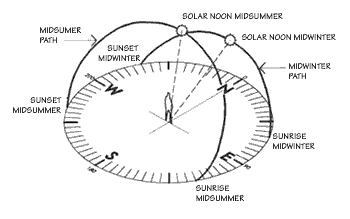 |
 |
||||||
| Shade Facts | Shade Trade |
Shade Design |
Shade Modeller |
Shade Audit |
|
The sun's daily and annual
path | ||
|
Sun Risks Truths and myths About skin cancer UV radiation & the sun Ultraviolet (UV) radiation Direct & indirect UV radiation Factors affecting UV levels The UV index UV radiation and vitamin D Plotting Shade The sun's daily + annual path Finding North Protecting against UVR Shade - the best protection Controlling direct UV radiation Controlling indirect UV radiation Links to related sites |
To achieve shade that falls in
the right place at the right time you must be able to
accurately predict where vegetation (trees, hedges etc) or
built structures will cast shade. The shade depends on the
position of the sun, which varies according to its daily and
annual path. In WebShade, ShadeModeller allows you to model existing and proposed shade. Once WebShade knows your location and the direction of True North, it can plot your shade for you. The sun’s daily path Shadows move continuously as the sun passes from east to west over the course of a day:
 The sun’s annual path The sun’s path also gradually changes throughout the year and so shadows vary according to the season. During the winter months the sun rises to the north of east and sets to the north of west and stays relatively low in the sky. During the summer months the sun rises to the south of east and sets to the south of west and is higher in the sky. The degree of these changes depends on your latitude. Four particular days of the year are important for understanding the sun’s annual path. Shade planners usually plot shade on these days so that they can predict how shade structures will perform at different times of the year. | |